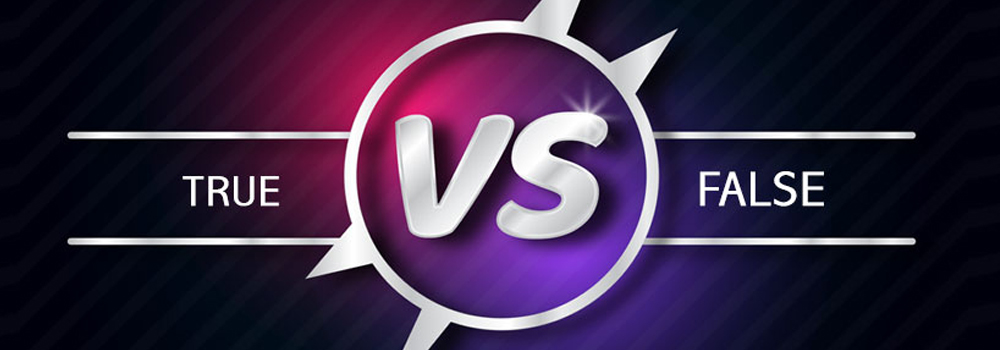The internet – a maze of disinformation
Search for a topic – any topic – on the internet, and you are likely to find a vast selection of information. Much of this information will appear to be contradictory; some may agree and, then again, some will just be a lure for advertisements or mislead you to another site. We've all been there. But how does all this information get out there?
Well, many people are not aware that the internet is neither regulated nor censored. Any person can post information online because it was initially designed to be like that: An exchange of information based on beliefs. But as the internet matured and became mainstream, it was supposed to be a repository of knowledge, an encyclopedia on every topic imaginable, and instantly searchable. Unfortunately, it wasn't to be.
The ability to make money from content has spurned a vast industry of disinformation. Often, this may just be harmless beliefs, opinions, or well-meant sharing of non-factual content. On the other hand, it may be outright deceptive and falsehoods cloaked in "official" looking websites. The purpose is not to educate anymore, but to make money through advertising or selling products and services that don't meet expectations. Of course, there are many reputable sites that adhere to the truth on the internet.
When it comes to facts about glutathione supplementation, it has also become increasingly challenging to filter the truth from the hype. Fortunately, misinformation about increasing glutathione is usually based on long-held beliefs and entrenched opinions rather than straight out deception. But, regardless, when these beliefs contradict established science, we end up in a situation where the consumer is fed myths rather than facts.
So, let's dispel some of the common myths you will encounter in your search for effective glutathione supplementation, including:
- Glutathione as a supplement in its many marketed forms
- N-acetylcysteine (NAC) and other cysteine pro-drugs
- Food sources and herbal remedies
The myth of supplementing with glutathione
The most heavily touted way to increase glutathione on the web is, of course, glutathione itself. It makes sense and is easily explained. To make glutathione even more attractive to unwitting consumers, it is often rebranded in scientific-sounding jargon, including:
- Liposomal
- Intranasal
- Sublingual
- Intravenous
- Nebulized
- Transdermal
But these fancy terms are just hiding the fact that there is nothing easy about glutathione supplementation. They are also hiding the fact that glutathione, no matter how it is delivered, is just that: Glutathione! But the science is clear about the fact that taking glutathione to increase our cellular glutathione stores does not work.
To understand this is complex, but we can break it down into a few simple facts:
-
Glutathione can only perform its many vital functions inside our cells
The benefits of glutathione for optimal health are undisputed. We often hear the term "Master Antioxidant" associated with glutathione, and this is absolutely true. It has many other essential benefits, too, some of which you can read in our other blogs.
But for glutathione to work, it must be inside our cells, and this turns out to be a big problem when trying to increase glutathione with glutathione itself or in any of the forms listed above Taking glutathione cannot enter our cells
This is a fact conveniently ignored by the glutathione supplement industry. But glutathione is a cellular antioxidant, a cellular detoxifier and a cellular assistant of energy production. It is simply not effective outside the cell. Glutathione, including glutathione in its many disguised forms, however, cannot enter cells for one very specific reason:
The concentration gradient problem
Glutathione taken orally or in any other form will end up in our blood plasma but will not be absorbed by our cells. This is because the concentration of glutathione inside our cells is always higher than outside. Picture one of our cells as a blown-up balloon and the air as glutathione. Glutathione will never be able to go inside because the concentration, or in this imaginary picture, the pressure, is much higher inside the balloon than outside. Since glutathione is naturally produced inside our cells, our body has therefore not developed a need or method for it to be absorbed from the blood.
The myth of supplementing with N-acetylcysteine (NAC)
Countless websites and products are promoting NAC as the miracle way of increasing glutathione. But is this reputation deserved? To find out, let's first look at where this reputation actually originated from.
NAC only has one medically registered purpose: It is an antidote to acetaminophen (Tylenol) overdose. This grave condition, unfortunately often intentional, severely depletes all of the body's stores of cellular glutathione resulting in organ failure induced by oxidative stress. In this case, NAC works by quickly supplying our cells with cysteine, one of the first building blocks of cellular glutathione production. This is also true in the case of severe malnutrition. That is good news, but how does this apply to ordinary people wishing to simply enhance their glutathione?
Unfortunately, it doesn't. Cysteine is a very common amino acid that we get from our everyday food. Our body can also make its own in the liver. Therefore, the ordinary person is never deficient in cysteine and has no need for ingesting more by taking NAC or any of the other cysteine-containing prodrugs available.
Websites promoting NAC will tell you that it is an essential building block of glutathione, and this is not in dispute by any means. However, what they don't tell you is the very fact that we do not need an extra supply of cysteine in our normal everyday lives. And NAC, despite its fancy name, is just a form of cysteine.
There have been countless studies on NAC's effect on glutathione production in otherwise healthy individuals, but none have been successful in showing a beneficial increase in cellular glutathione.
Food sources and herbal remedies
The world has caught onto the fact that glutathione is incredibly important to our health. We also know that many medical conditions, toxins in our environment, lifestyle choices such as excessive alcohol and smoking as well as strenuous exercise can lower cellular glutathione levels.
As a result, many well-meaning websites promote natural glutathione containing foods and herbal remedies from broccoli to milk thistle. But do they actually have a meaningful effect on our cellular glutathione levels?
Unfortunately not! The reasons for this are quite simple. First of all, the amount of glutathione these foods and herbs contain is tiny and has no beneficial impact on cellular glutathione. And secondly, we explained that taking a glutathione supplement will not increase cellular glutathione due to its inability to enter cells. The glutathione from foods and other remedies faces the same problem.
Do not shy away from these otherwise healthy foods, but do not expect them to be of use as a glutathione enhancing solution.
Fact: Glyteine® does promote cellular glutathione production
We now understand that supplementing our cellular glutathione is not as straight forward as the marketing hype on the internet has us believe. But fortunately, we now have Glyteine® available in Continual-G®, which has been clinically proven to enter cells where it is immediately converted to glutathione. So, we can now separate myth from fact and be confident in supporting our cellular glutathione production rapidly and in a single dose.
Based on sound scientific evidence, Glyteine®'s reputation for enhancing cellular glutathione safely and quickly is unrivalled. This is the Continual-G® advantage.






